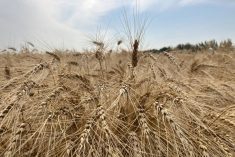Russia is not ready to remove a grain import duty, Deputy Prime Minister Arkady Dvorkovich said on Tuesday, a move that would open Russia’s market to foreign wheat to ease tight domestic supplies after last year’s poor harvest.
"No," said Dvorkovich when asked by Reuters whether he was prepared to support such a proposal. He did not elaborate.
Dvorkovich, a free trade advocate who took responsibility for the agricultural sector in government changes last year, is seen by the market as the deciding voice on the duty issue.
Read Also

U.S. livestock: Feeder cattle hit contract highs on tight supply
Chicago | Reuters – All Chicago Mercantile Exchange feeder cattle futures and most live cattle futures hit contract highs on…
The government has held preliminary talks on a possible decision to remove the five per cent import duty to help ensure adequate supplies after a drought and heavy export sales, an agriculture ministry spokesman said on Monday.
Moscow has surprised markets by keeping Russia’s export channel open despite last year’s poor crop. That was in contrast to its imposition of a one-year export ban in 2010 that, officials now concede, stoked inflation.
This season the decision to let exports flow has meant that Russia could face a domestic shortfall of grain, as the country has already shipped more than its nominal exportable surplus.
Analysts and industry leaders say Russia could require 1.5-2.5 million tonnes of grain imports to close the gap but are still debating whether Russia’s domestic prices have risen high enough to allow profitable imports.
Russia has already exported 13.7 million tonnes of grain in the current 2012-13 crop season which started on July 1.
Last year’s grain crop fell to 70.7 million tonnes from 94 million tonnes the previous season, while the wheat crop actually fell short of the extremely poor result recorded in the 2010, a year of searing drought in Russia.
Elimination of the duty would make it profitable to import grain into Russia and cool domestic prices, which have continued to rise in the new year despite government efforts to mitigate gains by intervening on regional markets with sales of state stocks.
Intervention sales began late last year in Siberia, whose producers were hard hit by the drought.
The government is launching intervention sales in European Russia early in the new calendar year, when inflation tends to accelerate due to annual tariff increases and rising food prices.
SovEcon consultancy said prices on Russia’s grain market continued to gain steadily when trade resumed after Russia’s extended New Year and Orthodox Christmas holidays, gaining 125 roubles per tonne to stand at 11450 roubles (US$380) per tonnne ex-works in European Russia.
By comparison, March milling wheat futures stood at 252.25 euros (US$340) per tonne. Some analysts say that physical market prices suggest French wheat could be imported to St. Petersburg more profitably than supplies from Russia’s central black soil region.
The head of Russia’s Grain Union, Arkady Zlochevsky, has said the country, which normally imports small volumes of grain, such as high-quality milling wheat for pasta, has said the market is overheated and sizeable imports are not yet required.
The agriculture ministry spokesman said on Monday a decision was not imminent and would be guided by the results of the intervention tenders.
While it would help the government fight inflation by cooling wholesale grain markets, it could also cause conflict with neighbouring Kazakhstan, a fellow wheat exporting country which maintains a common trade policy with Russia and Belarus under a three-country customs union.
If the Russian government were to lift the duty, the process of agreeing the change with the customs union could take several months.
— Reporting for Reuters by Lidia Kelly, writing by Douglas Busvine and Melissa Akin.















